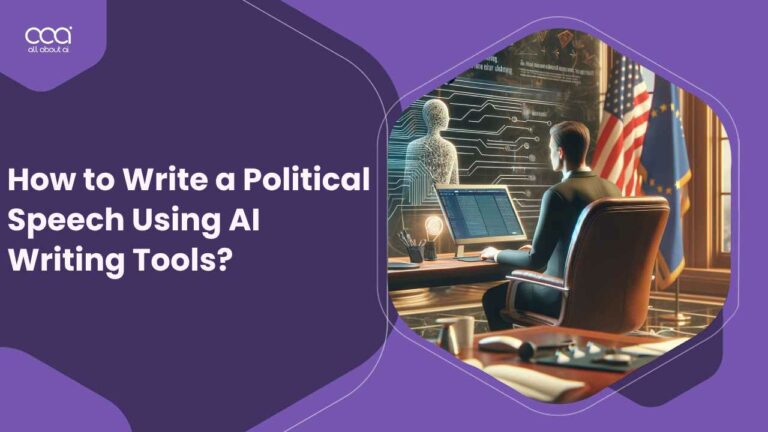In the dynamic world of politics, the art of speechwriting is crucial. With the recent popularity of AI writing tools, political leaders are finding new ways to enhance their speeches, making them more impactful and resonant with their audience.
This article will take a closer look at how to write a political speech using AI writing tools in Italy as well as the best AI writing tools in Italy for the task. Let’s get into it!
How to Write a Political Speech Using AI Writing Tools in Italy – Steps
Discover how to craft impactful political speeches with AI writing tools in 10 simple steps, enhancing your content by improving your message’s clarity, persuasiveness, and reach in the political arena.
Step 1: Define Your Core Message
Clearly elaborate on the central message or key points you want to communicate in your speech, aligning with your political stance and goals.
Practical Example:
I aimed to focus on educational reform. I asked Chatgpt, “Generate key points for a political speech on educational reform.” The AI outlined major areas to address, which I used as the foundation for my speech.
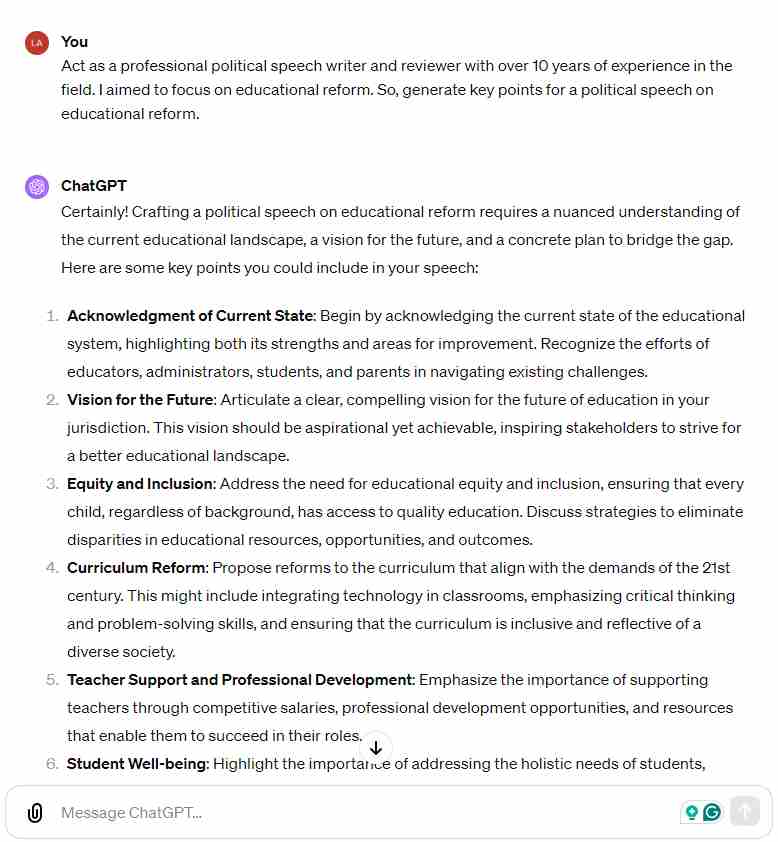
Step 2: Understand Your Audience
Use AI to gather insights about your audience’s demographics, concerns, and preferences to tailor your message effectively.
Practical Example:
To tailor my speech, I queried ChatGPT, “What are the main concerns of voters regarding educational reform?” The AI provided common voter concerns, which I integrated into my speech to make it more relatable.
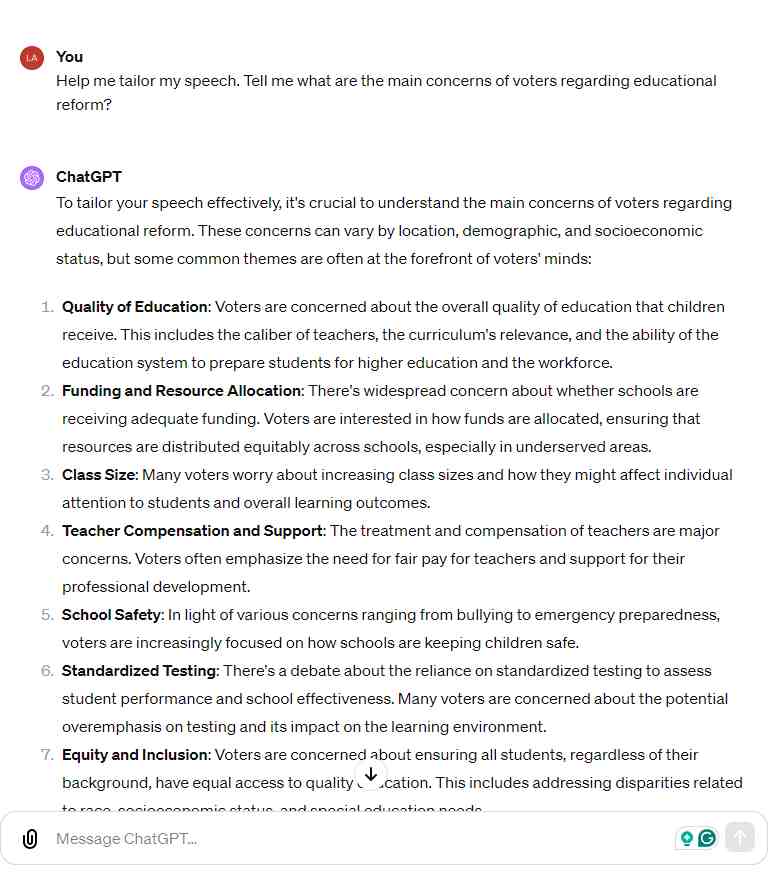
Step 3: Research Supporting Data
Leverage AI to find relevant facts, statistics, and examples that support your message and add credibility to your speech.
Practical Example:
I needed compelling data to back my points. I requested ChatGPT to “Provide statistics on the success of educational reform initiatives.” Using the provided data, I bolstered my arguments with concrete evidence.
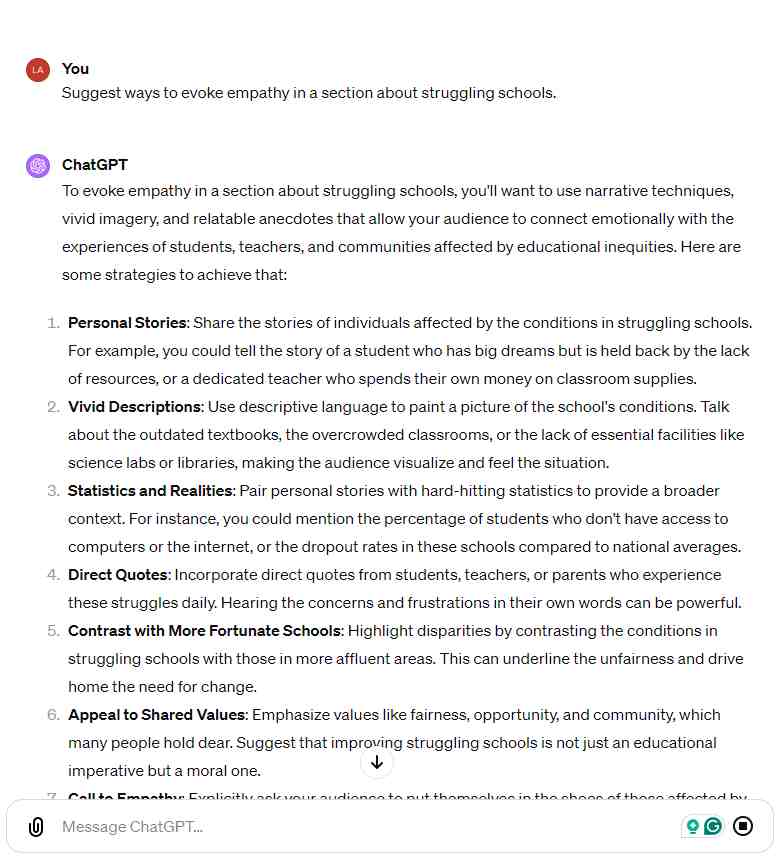
Step 4: Draft the Speech
Utilize AI to create a draft of your speech, ensuring it has a clear structure, including an introduction, body, and conclusion, and effectively conveys your message.
Practical Example:
For the introduction, I instructed ChatGPT, “Draft an engaging opening for a speech on educational reform.” The AI’s suggested opening set a strong tone, emphasizing the importance of the issue.
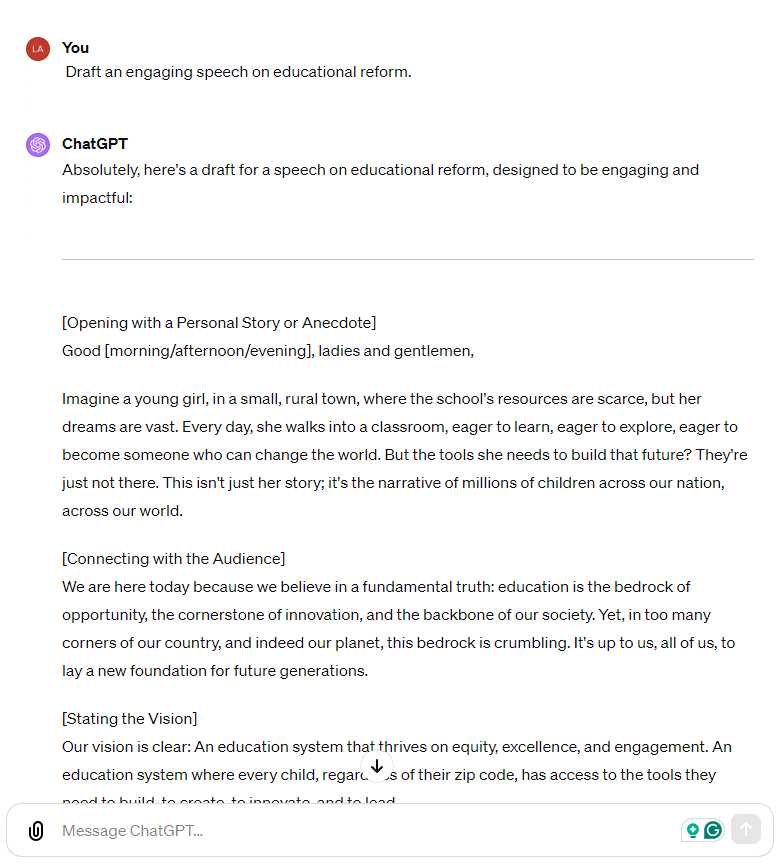
Step 5: Incorporate Emotional Appeals
Objective: Infuse your speech with emotional elements to connect with your audience on a personal level, using AI to suggest impactful language.
Practical Example:
To add emotional depth, I asked ChatGPT, “Suggest ways to evoke empathy in a section about struggling schools.” I used the AI’s suggestions to craft passages that would resonate emotionally with listeners.
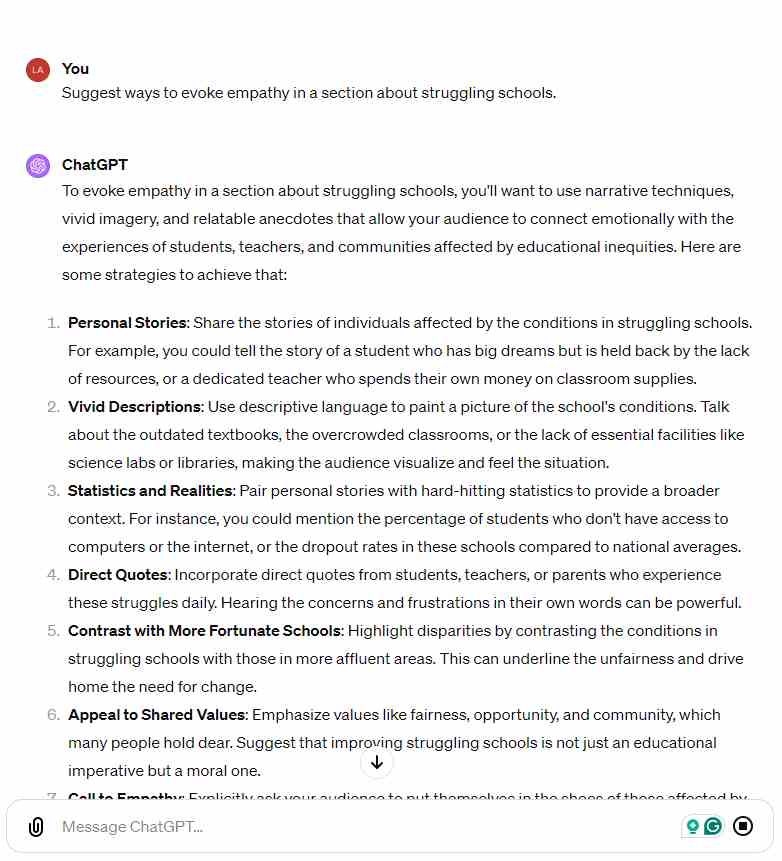
Step 6: Integrate Persuasive Techniques
Employ AI to weave persuasive techniques, such as rhetorical questions, repetition, and calls to action, into your speech to make it more compelling.
Practical Example:
I wanted to end with a strong call to action. I prompted ChatGPT, “Generate a persuasive conclusion for my educational reform speech.” The AI crafted a conclusion that motivated the audience to support reform efforts.
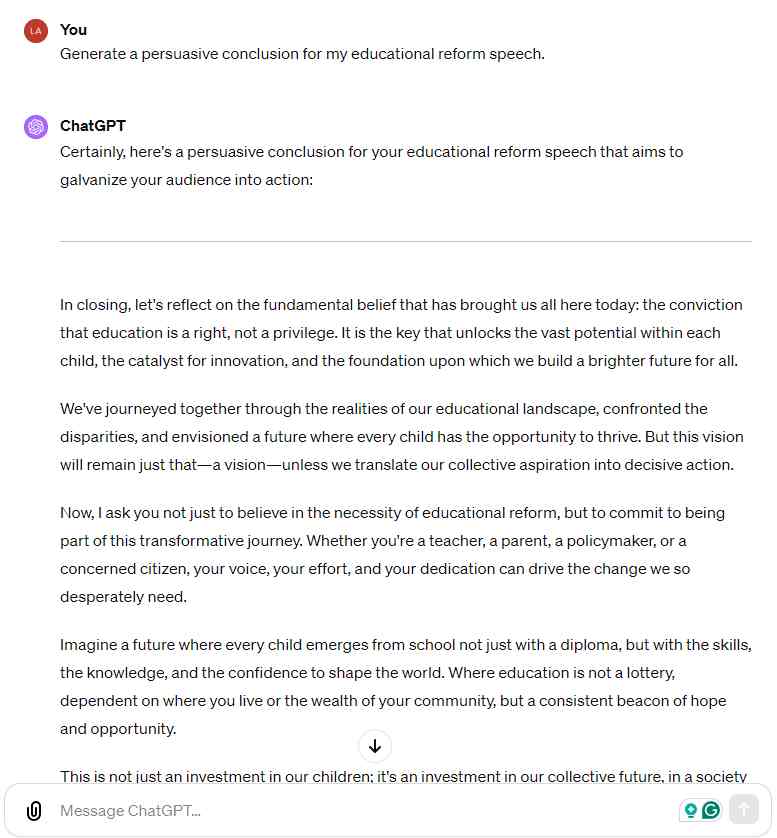
Step 7: Edit and Refine
After adding all the elements, edit and refine your speech to improve clarity, flow, and impact, using AI to suggest enhancements and ensure your message is delivered effectively.
Practical Example:
Before finalizing, I sought feedback on the coherence of my speech. I asked ChatGPT, “Review my speech for clarity and suggest improvements.” The AI’s feedback helped me fine-tune my wording for better audience comprehension.
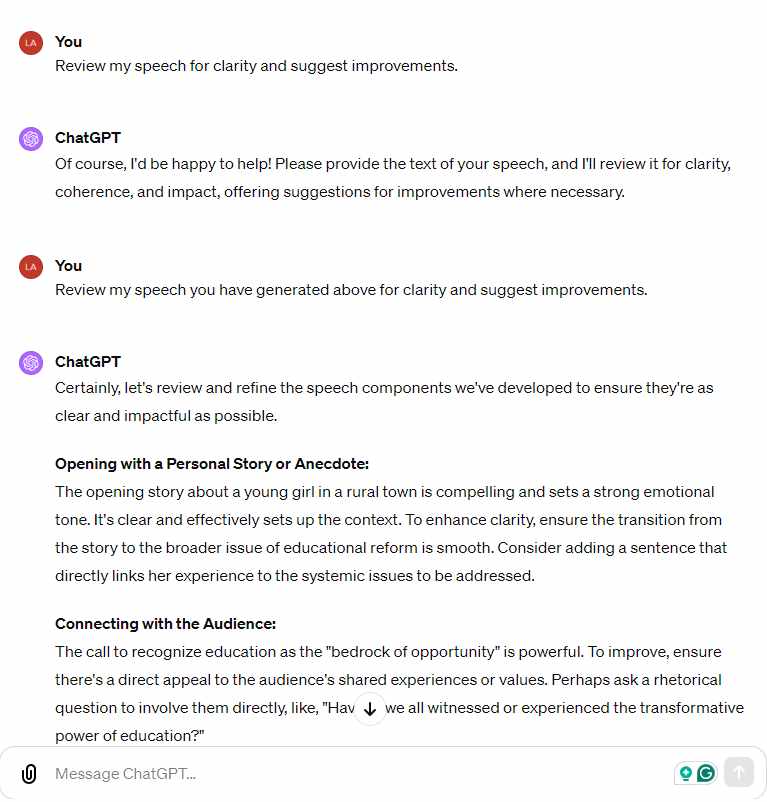
What Challenges Do Political Leaders Face in Speechwriting?
Traditionally, political speechwriting involves a meticulous process where speechwriters collaborate closely with the politician to capture their voice, stance, and message.

This process often starts with brainstorming sessions, follow
ed by drafting and revising the speech multiple times. Speechwriters must deeply understand both the political landscape and the politician’s personal style.
Before getting into how to write a political speech using AI writing tools in Italy, here are some challenges associated with the traditional method of writing these speeches.
Challenges in Traditional Speechwriting
This method, as expected, comes with a lot of challenges.
Time Constraints and Deadlines
Politicians often operate under tight schedules, needing speeches for various events with little notice. This time pressure can limit the quality and depth of the speeches.
Balancing Facts with Emotional Appeal
Effective political speeches must strike a balance between factual accuracy and emotional resonance, a challenging feat that requires skill and experience.
Keeping Up with Current Events
The fast-paced nature of politics means that speeches must constantly be updated to reflect the latest developments, a task that can be overwhelming.
Audience Diversification
Speechwriters need to address a wide range of audience demographics, making it challenging to create a speech that resonates with everyone.
Maintaining Authenticity
Ensuring the speech aligns with the politician’s personal beliefs and public image is crucial, yet challenging, as it requires a deep understanding of the politician’s persona.
How Do AI Writing Tools Transform Political Speechwriting?
AI writing tools bring a transformative approach to political speechwriting. These tools use natural language processing and machine learning to generate content that’s not only grammatically correct but also contextually relevant.
They can analyze vast amounts of data to suggest content that aligns with current trends and public sentiment, making speeches more effective and timely.
Efficiency in Research and Data Gathering
These tools can process and analyze data from a wide range of sources – including news articles, public opinion polls, and academic journals – much faster than a human researcher.
This capability ensures that speeches are not only informed by the most current data but also encompass a broader range of perspectives and facts. Such depth and breadth in research enhance the credibility and relevance of the speeches.
Enhanced Persuasive Elements through AI Analysis
One of the key transformations brought by AI in political speechwriting is the enhancement of persuasive elements. AI tools can analyze large sets of historical speeches, identifying patterns and elements that have historically resonated with audiences.
By applying this analysis, speechwriters can craft messages that are more likely to engage and persuade the target audience. This includes optimizing the use of rhetorical devices, analogies, and emotionally resonant language tailored to specific demographics and cultural contexts.
Tailoring Tone and Style to Audience Demographics
AI tools excel in customizing the tone and style of a speech to suit diverse audience demographics. They can analyze demographic data, including age, location, cultural background, and political inclinations, to suggest language and themes that are more likely to resonate with different groups.
This level of customization is particularly useful in politics, where the ability to connect with a diverse electorate is crucial. By ensuring that the speech is relevant and appealing to various segments of the audience, AI tools significantly enhance the speech’s overall impact and effectiveness.
Real-Time Content Adaptation
Another significant advantage of AI in political speechwriting is its ability to adapt content in real-time.
AI tools can provide speechwriters with instant feedback on how certain sections of the speech might be received, based on current news events or shifting public opinion.
This adaptability allows for the dynamic tweaking of content to ensure that the speech remains relevant and impactful, even in the rapidly changing landscape of political discourse.
Personalization at Scale
AI writing tools bring a sophisticated level of language and sentiment analysis to the speechwriting process. They can evaluate the speech for clarity, coherence, and emotional impact, suggesting improvements where necessary.
Additionally, these tools can assess the sentiment of the speech, ensuring that the intended message aligns with the emotional tone. This analysis is crucial in political speechwriting, where the emotional undertone can be as influential as the content itself.
What Are the Best AI Writing Tools for Political Speechwriting?
Knowing how to write a political speech using AI writing tools in Italy isn’t enough. You also need the right tools. Several AI writing tools stand out for political speechwriting. Tools like OpenAI’s GPT-4, IBM Watson, and Google’s BERT offer unique features such as tone analysis, sentiment analysis, and real-time content suggestions.
These tools can assist in crafting speeches that are emotionally resonant and factually accurate.
Here’s a brief look at all three.
OpenAI’s GPT-4
GPT-4 offers nuanced language generation, making it adept at mimicking human speech patterns. Its vast knowledge base allows for the incorporation of up-to-date information, and its sophisticated language models can capture various tones and styles, making it ideal for political speechwriting.
IBM Watson
IBM Watson excels in sentiment analysis and tone detection, crucial for crafting speeches that resonate emotionally. Its ability to analyze and interpret complex data sets makes it a valuable tool for ensuring speeches are factually accurate and impactful.
Google BERT
Google BERT is proficient in contextual language understanding, which is vital for creating speeches that are coherent and contextually relevant. Its search algorithm can be leveraged to gather the most pertinent information for speech topics, ensuring content relevance and accuracy.
How to Integrate AI Writing Tools in Your Political Speechwriting Process?
Learning how to write a political speech using AI writing tools in Italy and integrating these tools into the political speechwriting process involves a few key steps:

- Initial Research and Data Compilation: Use AI to gather and compile data relevant to the speech’s topic, ensuring a comprehensive understanding of the subject.
- Drafting the Core Message: Leverage AI to create a draft that encapsulates the core message, aligning it with the politician’s stance and the audience’s interests.
- Refining Tone and Style: Utilize AI tools to refine the speech’s tone and style, making it resonate with the intended audience demographic.
- Incorporating Real-Time Updates: Employ AI to provide real-time updates and suggestions, keeping the speech relevant and timely.
- Final Review and Personalization: Collaborate with the politician for a final review, ensuring the speech aligns with their voice and message, adding personal touches where necessary.
What Makes AI-Enhanced Speeches More Effective?
AI offers a whole host of benefits for politicians looking to write engaging and powerful speeches. Here’s how AI can enhance the speech writing process.
- Data-Driven Insights: AI tools provide insights based on large data sets, making speeches more relevant and impactful.
- Audience Engagement: AI’s ability to analyze audience data helps in crafting speeches that better engage and resonate with the audience.
- Timeliness and Relevance: AI enhances the ability to quickly update speeches, ensuring they are always relevant to current events.
- Diversity of Content: AI can generate a wide range of content, allowing for more diverse and dynamic speeches.
- Precision in Language: AI’s advanced language capabilities ensure speeches are clear, concise, and powerful.
Are There Ethical Considerations in Using AI Writing Tools for Political Speeches?
The use of AI in political speechwriting does raise ethical considerations. It’s crucial to maintain transparency about the use of AI and ensure that the final message accurately reflects the leader’s views and policies.
- Transparency about AI Involvement: There should be clarity and honesty about the extent of AI’s role in speech creation to maintain public trust.
- Risk of Misinformation: AI-generated content could inadvertently include inaccuracies or biases, which must be carefully monitored.
- Loss of Personal Touch: Over-reliance on AI might lead to speeches that lack the human touch and authenticity, potentially disconnecting the politician from their audience.
- Privacy Concerns: Using AI tools raises questions about data privacy, especially when analyzing audience data for tailoring speeches.
Can AI Completely Replace Human Speechwriters?
While AI tools offer significant advantages in efficiency and data processing, they cannot fully replace human speechwriters.

Human creativity, empathy, and ethical judgment are crucial in crafting speeches that truly resonate with audiences on a personal level.
Moreover, the nuanced understanding of political subtleties and the ability to inject genuine passion and conviction into speeches remain uniquely human traits.
AI serves as a powerful tool, but the essence of political speechwriting lies in the human touch that connects a leader with their audience. However, knowing how to write a political speech using AI writing tools in Italy can make the process far more efficient than traditional methods.
FAQs
Can you use AI to write a speech?
Does AI have free speech?
What are the applications of AI in politics?
What are the AI tools for public speaking?
Conclusion
AI writing tools offer a revolutionary approach to political speechwriting. They provide efficiency, data-driven insights, and enhanced speech quality. However, it is imperative to balance their use with ethical considerations and the irreplaceable human touch.
Writing speeches isn’t the only thing AI is adept at. Now that you know how to write a political speech using AI writing tools in Italy, read through the articles we have in our how-to guides. Alternatively, if you want to improve your knowledge of AI, check out our AI glossary.

